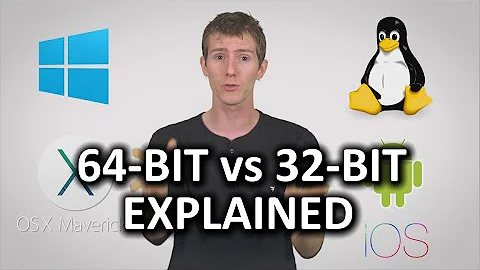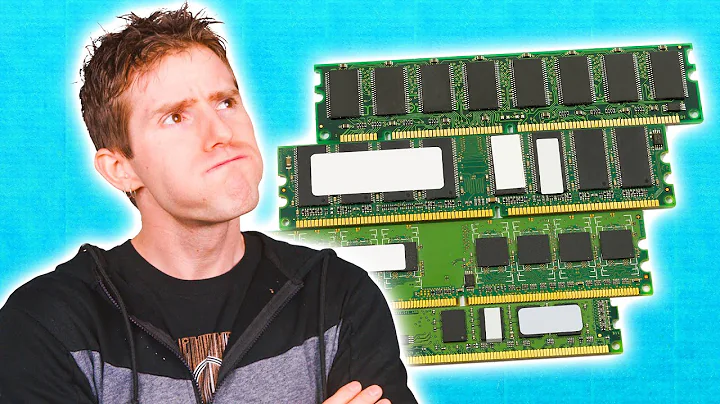Is 32 or 64 bit better for a computer with 2 GB memory?
Solution 1
You list your processor as "Intel(R) Pentium(R) 4 CPU 2.80GHz, x86 Family"
Anything in the x86 Family is a 32-bit processor. You need to install the 32bit version.
If you had a AMD64 or x86_64 Family it would be a 64bit processor and capable of running a 64bit version.
As for the memory issue. The main difference between 32bit and 64bit is the ability to address more memory. A 32-bit processor can only handle up to 4GB or 2^32 = 4GB. A 64-bit can handle much more than that 2^64 = 16EB = 17,179,869,184. The implementation details are much more complex than this description.
Solution 2
The Pentium 4 line is mostly X86-32 (32bit). However you state that yours is Family 15 model 4 2.8ghz. A google search reveals that the 511 in that series is X86-64 (64bit).
http://ark.intel.com/products/27453/Intel-Pentium-4-Processor-511-1M-Cache-2_80A-GHz-533-MHz-FSB
Therefore the 64bit version of Xubuntu may be an option for you. With 2gb of ram you absolutely can happily run a 64bit operating system though you may find it consumes a little more of your ram than a 32bit install.
Solution 3
64 bit is the recommended system these days ( it's not just about memory ), but I don't think that old CPU is 64 bit capable, so you will need to stick with 32 bit.
Solution 4
If your processor really is 64-bit capable (try booting from 64-bit LiveCD), I still think 64-bit system will give you no benefits.
64-bit systems may use more than 64GB, 32-bit with PAE (http://en.m.wikipedia.org/wiki/Physical_Address_Extension) may use up to 64 GB, without PAE -- up to 4GB. Those amounts of memory include not just physical memory, but virtual memory as well, so you cannot enlarge swap file or swap partition to overcome the limits.
Even a PAE 32-bit system can NOT allocate more than 4GB (memory and address space) to a single app, so apps that deal with huge amounts of data sometimes require 64-bit.
Generally if you compare the 32- and 64- bit versions of the same OS or of the same app, 64-bit one will use more memory due to larger size of primitive datatypes (mostly pointers). Which one will be faster, depends on application.
So, if you do not have much memory, and do not have apps that need more than 4GB of memory or of address space, 32-bit system is quite ok. 64-bit one is usually needed for systems with a lot of memory. However, even in your case it is good to use 64-bit if some of your apps fail due to lack of virtual address space (it is not a very common problem, but sometimes it happens).
Related videos on Youtube
user250093
A non-techie who has fallen in love with all things Linux and open source. (Slow to learn but once I get it I get it.) (Usually.)
Updated on September 18, 2022Comments
-
user250093 almost 2 years
This is the computer I have currently with Xubuntu 13.10 installed on it, and it works well:
- OS version: Microsoft Windows XP Professional, Service Pack 3, 32 bit
- Processor: Intel(R) Pentium(R) 4 CPU 2.80 GHz, x86 Family 15 Model 4 Stepping 1
- Processor count: 1
- RAM: 1149 MB
- Graphics card: Intel(R) 82865G Graphics Controller, 96 MB
- Hard drives: C: Total - 38091 MB, Free - 17316 MB;
- Motherboard: Dell Computer Corp., 0U2575
- Antivirus: CA Anti-Virus Plus, Updated: No, On-Demand Scanner: Enabled
However, I do a lot of editing of large digital photos, and I'm converting a second computer, with the exact same specifications as this one, to Xubuntu 13.10, AND I'm replacing the 128 MB memory module with a 1 GB module, giving me a total of 2 GB. I have read a lot of posts here that say with 2 GB it is best to go with the 32 bit download of 13.10. But I have also read a lot of posts here that say it's best to go with the 64-bit. That 2 GB is plenty to run 64-bit software, and that 32 bit software is rapidly becoming obsolete.
What is the explanation to clear up the confusion?
-
halfer over 10 yearsIf it's a 32 bit processor, afaik the 64 bit one will not run.
-
 phuclv over 10 yearsuse CPU-Z to check if your CPU supports EM64T instruction set
phuclv over 10 yearsuse CPU-Z to check if your CPU supports EM64T instruction set -
Eliah Kagan over 10 yearsSince it turns out this is an XY problem, and is really about user250093's processor rather than RAM, and the issue of 32-bit processors supporting only the 32-bit version is covered well in at least one good answer to What are the differences between 32-bit and 64-bit, and which should I choose? (which also has answers that cover RAM considerations somewhat extensively), I'd suggest we close this as a duplicate of that question.
-
 phuclv over 10 years@OP: you should provide the CPU model. There's not only one 2.8GHz Pentium 4 CPU
phuclv over 10 years@OP: you should provide the CPU model. There's not only one 2.8GHz Pentium 4 CPU -
 Meow over 10 yearsyou don't really have 2gb of ram!!
Meow over 10 yearsyou don't really have 2gb of ram!! -
 Meow over 10 yearsgrc.com/securable.htm use it to find if your processor is 64 or not
Meow over 10 yearsgrc.com/securable.htm use it to find if your processor is 64 or not
-
 phuclv over 10 yearsNo, some models of Pentium 4 since Prescott have x86_64 instruction set
phuclv over 10 yearsNo, some models of Pentium 4 since Prescott have x86_64 instruction set -
 Nabil over 10 yearsDon't know why someone downvoted this answer, It's a good one. So I am upvoting this to make it equal.
Nabil over 10 yearsDon't know why someone downvoted this answer, It's a good one. So I am upvoting this to make it equal. -
 mango over 10 yearsI stand corrected. Some Pentium 4 cpus from around 2006 such as some of the ones in the HT line were X86-64. HT=Hyper Threading. Basically the last ones before the Intel Core2 series was pushed out in time for Vista's unveiling.
mango over 10 yearsI stand corrected. Some Pentium 4 cpus from around 2006 such as some of the ones in the HT line were X86-64. HT=Hyper Threading. Basically the last ones before the Intel Core2 series was pushed out in time for Vista's unveiling. -
 phuclv over 10 yearsThere's (at least) a 64-bit 2.8GHz Pentium 4 CPU here ark.intel.com/products/42114/…. I cannot infer anything without knowing the correct CPU model
phuclv over 10 yearsThere's (at least) a 64-bit 2.8GHz Pentium 4 CPU here ark.intel.com/products/42114/…. I cannot infer anything without knowing the correct CPU model -
 mango over 10 yearsThat's Pentium D not Pentium 4. Pentium Ds are built off Pentium 4.
mango over 10 yearsThat's Pentium D not Pentium 4. Pentium Ds are built off Pentium 4. -
 mango over 10 yearsMy answer has been edited. The OP has a model 4 which is available in 64bit at 2.8ghz.
mango over 10 yearsMy answer has been edited. The OP has a model 4 which is available in 64bit at 2.8ghz. -
Braiam over 10 yearsMy current processor is a P4 and is 64-bit capable...
-
 phuclv over 10 yearsThis is XP, not windows 7, you cannot conclude anything from that line. x86 means x86 family, it doesn't mean that it doesn't support x86_64 extension
phuclv over 10 yearsThis is XP, not windows 7, you cannot conclude anything from that line. x86 means x86 family, it doesn't mean that it doesn't support x86_64 extension -
 phuclv over 10 yearssome P4 CPUs from Prescott and above support x86_64 instruction set
phuclv over 10 yearssome P4 CPUs from Prescott and above support x86_64 instruction set -
 mango over 10 yearspostbin.djun.net/pages/article14/page.php = Find out if you have 32bit or 64bit cpu.
mango over 10 yearspostbin.djun.net/pages/article14/page.php = Find out if you have 32bit or 64bit cpu. -
 phuclv over 10 yearsahh sorry misread the CPU type
phuclv over 10 yearsahh sorry misread the CPU type -
Andreas over 6 yearsSince this was written, 2^64 has been revised from 17,179,869,184 to 18,446,744,073,709,551,616.




